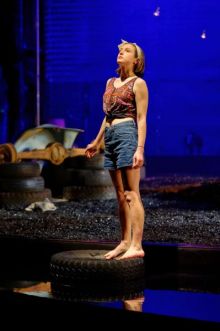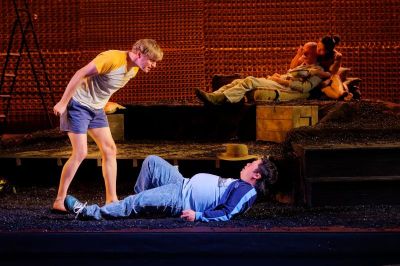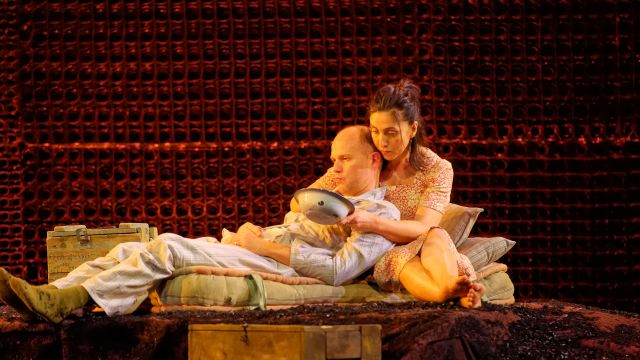That Eye, the Sky.
As a critic who sees a lot of theatre it is not often I come away from a play unsure how I feel about the show. However, I was strangely conflicted in exactly that way immediately after opening night of State Theatre SA’s staging of the Justin Monjo and Richard Roxburgh adaptation of Tim Winton’s novel That Eye, the Sky.
Of course, I soon realised my initial reaction was a natural response to one of Tim Winton’s works. After all, we are accustomed to characters we can put into boxes, as well as narratives that have ‘closure’, but as in Winton’s other stories, the narrative and the people who inhabit That Eye, the Sky don’t allow for any of that. In many ways, and acknowledged in the program by this play’s Director Kate Champion, Tim Winton’s characters are confusing contradictions and his stories defy defined endings. He has said, ‘Closure is a sort of confection; it’s a construct that people wrestle on to the messiness of life. But life is open-ended and cyclical, more ragged, more strange, harder to wrangle neatness out of than people will admit.’
That Eye, the Sky is a story told from the perspective of twelve-year-old Morton (Ort) Flack who is on the brink of starting his secondary education and lives an isolated, hippy-style life with his family in rural Western Australia. Ort had an accident as a young child and now is a little behind his peers at school. He has only one friend, Fat Cherry, but the friendship is tenuous. Ort spends a lot of time losing himself in his thoughts, including imagining the sky as a blue eye watching down over everyone. He imagines and clearly sees an ethereal, filmy cloud above his house that is many things, including a protector. Early in the narrative, Ort’s father is severely brain damaged in a car accident and is discharged home from hospital in a semi-comatose state. This creates devastating change in the circumstances of a family already caring for their demented grandmother. Lives and relationships change even more when a mysterious drifter, who touts himself as an evangelical preacher, turns up at the house and offers both physical help and spiritual healing.

The dirt and desolation of a rundown rural farm is well illustrated in the atmospheric set. The entire stage is used and is covered by black ‘dirt’. Set upon an undefined mound of various levels are grubby, dusty mattresses, pallets, tyres, a shovel, an old bath and various other random items. Surrounding the mound is a ‘yard’ containing a stepladder, old machinery, car parts, boxes, a wheelbarrow and 44 gallon drums, among other items. Everything contributes in some way to the designation of various settings, such as a bedroom, a schoolroom and the Cherry workplace/property. In the foreground is a water-filled channel representing a river. The entire set is backed by a towering dark wall. In various scenes globes that are set into the back wall illuminate, as if to light the night like a formation of stars.
Despite his obvious adulthood and tall physique, Tim Overton produces a brilliant performance and is utterly convincing as 12-year-old Ort Flack. Overton skilfully captures the essence of this warm-hearted, impulsive, loving young boy who is in many ways overwhelmed by the tragedy that has impacted his family but doesn’t voice it to them, instead finding solace and release by observing people, playing with his pet chicken, jogging around the property and escaping into his imagination.
In her physically demanding performance as Ort’s mother (Alice Flack) Elena Carapetis embodies the strength and stoicism of women who live isolated lives away from big cities. After her husband’s accident, Alice becomes his carer but this can’t deny the needs she has as a woman. The love and desire Alice still has for the semi-comatose, totally disabled husband she must now care for comes through loud and clear. Less obvious in Carapetis’s portrayal is the effect Alice’s escalating drinking may be having on Alice or even on her interaction with her family. This seems a lost opportunity with which to give the character even more depth.
Kate Cheel is superb as Ort’s 16-year-old rebellious sister Tegwyn. Cheel is totally convincing as a verbally cutting, frustrated, emotionally fraught teenager who rejects her family’s ways and is desperate to find herself. Cheel creates a character full of confliction and need for love, a girl vulnerable to exploitation. The scene in which Tegwyn self-harms is chillingly realistic and completely heartbreaking.

Bill Allert spends only a few minutes at the very beginning of the play as the fully alert and responsive husband and father Sam Flack, before the character is reduced by brain damage to a semi-comatose dependent man. Allert is very convincing in the very difficult role.
Christopher Pitman is very fine as the darkly mysterious, damaged drifter and preacher Henry Warburton, a man who insinuates himself into the Flack family’s world in their hour of need and who has past failings that will rise again to influence and affect this family, especially Tegwyn.
Michelle Nightingale plays various roles, including Mrs Cherry and a teacher, but is particularly good as Ort’s grandmother, whom he calls ‘Grammar’. Nightingale has the walk, the tentative gestures, in fact the total persona of a woman with dementia down pat. This is a very good performance, instilling Grammar with a realistic vulnerability that is very touching.
Rory Walker is very good in his roles, particularly as the blustering, aggressive Mr Cherry. Ezra Juanta is terrific as Mr and Mrs Cherry’s son, Ort’s year 7 friend, Fat Cherry.
Director Kate Champion’s background in dance and choreography is evident in her direction, with a dreamlike aura to the performance and pace. The necessary physicality involved in lifting and carrying a disabled person is exquisitely achieved through her guidance of the cast who must do this lifting. Let us hope their backs hold out for the season.

Sound design is excellent, including the sudden and intrusive sound of Sam Flack’s car crash. The sound, combined with the visual impact of Sam’s head hitting the huge, transparent screen that is present at the play’s beginning and which rises to become the cloud, is wonderfully well achieved. Lighting and music score are perfect, creating absorbing and atmospheric effects. Costumes are also excellent.
The narrative leaves us with some hope for improvement in the Flack family’s circumstances, but we still wonder what future there will be for Ort and his family. Like real life, there are no answers to be had in the here and now.
Infused with tragedy, sadness, love, conflict, spirituality, human failings and a boy’s first tentative steps into the realities of his future, That Eye, the Sky will surely leave audience members with plenty to contemplate about ourselves.
Lesley Reed
Photographer: Chris Herzfeld.
Subscribe to our E-Newsletter, buy our latest print edition or find a Performing Arts book at Book Nook.

